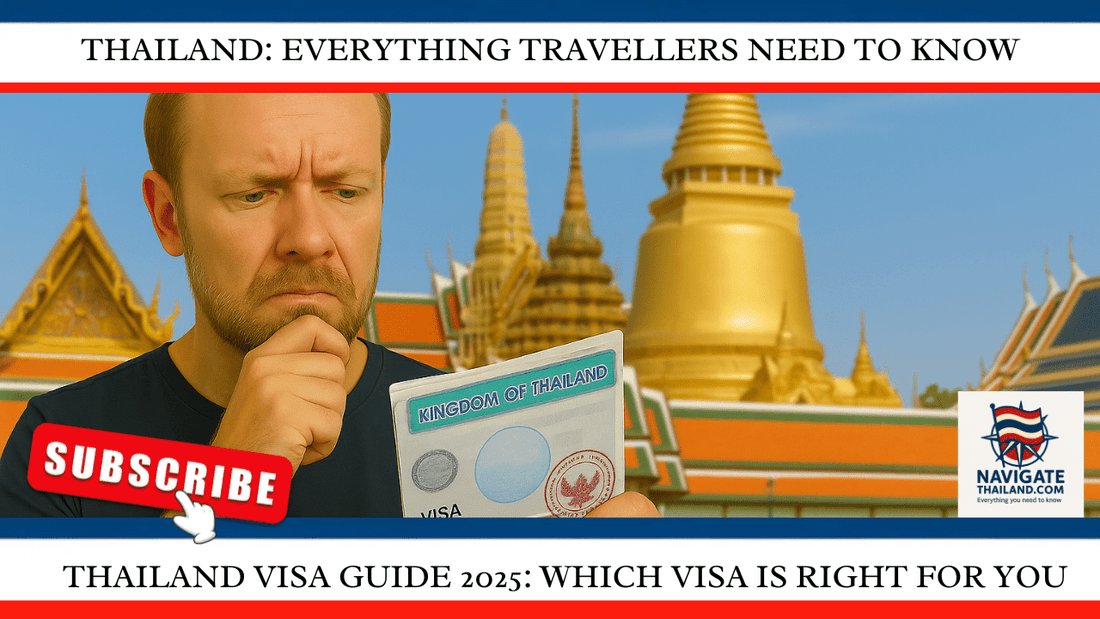
Thailand Visa Guide 2025: Which Visa is Right for You?
Share
Thailand continues to attract travellers, expats, and investors from around the world thanks to its rich culture, tropical landscapes, and cost-effective lifestyle. Whether you’re planning a holiday, starting a business, or retiring in paradise, Thailand has a visa tailored to your purpose.
This 2025 guide breaks down the most common visa types, eligibility requirements, benefits, and restrictions to help you choose the right path for your stay in the Land of Smiles.
1. Tourist Visa (TR Visa)
Ideal for those visiting Thailand for sightseeing or short-term holidays. The standard tourist visa allows a 60-day stay, which can usually be extended by 30 more days at a local immigration office.
Tourists from visa-exempt countries (such as Australia, UK, EU, USA, and Canada) can typically enter Thailand without a visa for up to 30 days (or 15 days if arriving by land). Visa-on-arrival is also available for select nationalities.
You must show a valid passport, proof of onward travel, and financial evidence (typically 10,000 THB per person or 20,000 THB per family).
2. Non-Immigrant B Visa (Business or Work)
This visa is intended for those working for a Thai company or conducting official business in Thailand.
The initial stay is 90 days, with possible one-year extensions. To qualify, you’ll need a job offer, company sponsorship, work permit application, and proof of income.
If you’re investing or launching a business, you may also apply under this category—though requirements are more complex and involve Thai employment quotas and capital investment benchmarks.
3. Non-Immigrant ED Visa (Education)
Perfect for students, language learners, or those attending a university or vocational training in Thailand.
You’ll need proof of enrollment, a valid passport, and funds to support your stay. This visa starts with a 90-day validity but can be extended while you study. Some Muay Thai, cooking, or language schools also offer education visa sponsorship.
Note: You cannot legally work on an ED visa.
4. Non-Immigrant O Visa (Retirement or Dependent)
This visa suits retirees over 50 and dependents of Thai citizens or foreign residents.
To qualify for a retirement visa (O-A), you’ll need to show financial proof—either 800,000 THB in a Thai bank or a monthly income of 65,000 THB. Health insurance is also mandatory. You’ll get a one-year renewable stay, but work is not permitted.
Dependent visas (also under category O) are available for spouses, children, or caretakers of visa holders.
5. Thai Elite Visa (Long-Term Tourist)
The Thai Elite Visa offers premium, long-term stay options ranging from 5 to 20 years with VIP perks like fast-track airport service, healthcare privileges, and business networking events.
Membership starts at 900,000 THB (approx. AUD 37,000) for the 5-year option and can go up to 2 million THB depending on your package. While you can’t work on this visa, it’s popular with long-term travellers, retirees, and location-independent entrepreneurs.
6. Long-Term Resident (LTR) Visa
Launched for wealthy expats, digital professionals, and retirees, the LTR Visa allows a 10-year stay with fewer reporting requirements and tax perks.
You must meet income or investment thresholds—such as USD $80,000 annual income or USD $500,000 in Thai real estate or businesses. This visa also provides a work permit and includes family members.
Application is managed by the Thailand Board of Investment (BOI).
7. Destination Thailand Visa (DTV)
New in 2024 and continuing into 2025, this visa is designed for digital nomads, remote workers, and long-term travellers who want flexibility.
Holders can stay up to 180 days per entry, with multiple entries allowed over five years. Applicants need to show proof of remote income and a valid employment or freelance arrangement.
Local employment is not allowed under this visa, but it’s ideal for online workers wanting to live in Thailand part-time.
8. Smart Visa
The Smart Visa is geared toward professionals, investors, and entrepreneurs in high-tech and innovation sectors such as robotics, biotech, or renewable energy.
It’s valid for up to four years and removes the need for a separate work permit. You’ll need to prove a minimum income (usually 100,000 THB/month) or business investment. Spouses and children are also eligible under this visa.
Application is handled by the BOI Smart Visa Unit.
Which Visa Is Right for You?
• Tourists: TR Visa, Visa Exemption, or Thai Elite Visa
• Business or Employment: Non-Immigrant B Visa or Smart Visa
• Retirees (50+): Non-Immigrant O Visa or Thai Elite Visa
• Students: Non-Immigrant ED Visa
• Digital Nomads: Destination Thailand Visa (DTV)
• Investors/High Earners: Long-Term Resident Visa or Smart Visa
Final Advice
Visa rules in Thailand can change frequently, so always double-check the latest requirements from official sources like:
• The Royal Thai Embassy
• Thai Immigration Bureau
• Thailand Board of Investment (BOI)
Consulting a visa agent or Thai lawyer may also help streamline your application and avoid unnecessary delays.
Conclusion
Whether you’re here for two weeks or ten years, Thailand offers a flexible range of visas to suit every type of traveller. From students and remote workers to retirees and investors, 2025 is a great time to explore what the Kingdom has to offer—with the right visa in hand.
Have questions or personal experiences to share? Drop a comment below, and don’t forget to subscribe to our YouTube channel for video breakdowns of our most popular blogs.
References:
1. Royal Thai Embassy
2. Thai Immigration Bureau
3. Thailand Board of Investment – Smart Visa Unit
Read more of our Thailand blog series:
Thai Food Guide:Traditional Recipes and Street Eats
Everything Travellers Need to know
Thailand travel ebooks and language guides
Thailand Travel Apparel & Souvenir Gifts
Subscribe to our YouTube channel Navigate Thailand to see our most popular Thailand travel blogs turned into videos:
Navigate Thailand YouTube channel
